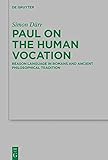Paul on the human vocation : reason language in Romans and ancient philosophical tradition / Simon Dürr.
Material type: TextSeries: Beihefte zur Zeitschrift f�r die neutestamentliche Wissenschaft ; volume 226.Publication details: Berlin : Boston : De Gruyter, 2021.Description: 1 online resource (xi, 327 p.)ISBN:
TextSeries: Beihefte zur Zeitschrift f�r die neutestamentliche Wissenschaft ; volume 226.Publication details: Berlin : Boston : De Gruyter, 2021.Description: 1 online resource (xi, 327 p.)ISBN: - 9783110750560
- 3110750562
- 227.106
- BS2665.52 .D87 2021eb
| Item type | Current library | Call number | Status | Notes | Date due | Barcode |
|---|---|---|---|---|---|---|
 Elektronička knjiga
Elektronička knjiga
|
Open Acess (Otvoreni pristup) | OAB227.106DURpa (Browse shelf(Opens below)) | Available | Otvoreni pristup | 6170711 |
Browsing Open Acess (Otvoreni pristup) shelves Close shelf browser (Hides shelf browser)

|

|

|

|

|

|

|
||
| OAB226.048BI/FR/KOcl Classical Greek models of the Gospels and Acts : studies in Mimesis criticism / | OAB226.1BA/RE/WIca Canones: The Art of Harmony : the Canon Tables of the Four Gospels / | OAB227/.0476HO/KR/MA/SMpr The principal Pauline Epistles : a collation of Old Latin witnesses / | OAB227.106DURpa Paul on the human vocation : reason language in Romans and ancient philosophical tradition / | OAB227.107CH/DE/KRka Karl Barth's epistle to the Romans : retrospect and prospect / | OAB230.01HO/HIsp In spirit and in truth : philosophical reflections on liturgy and worship / | OAB230.14092STAap Apophasis and pseudonymity in Dionysius the Areopagite 'no longer I' / |
Includes bibliograhical references and indexes.
880-01 1 Introduction to the problem -- 2 The semantics of zōon logikon and the definition of human beings -- 3 The wider Greco-Roman discourse on being human and the idea of a human role in the cosmos -- 4 Epictetus and the idea of a human calling based on human reason -- 5 Romans as a letter about being human -- 6 Rom 12.1-2 as an exhortation to genuine humanness -- 7 The vision of integrated (missional) existence in Rom 12-15 -- 8 Paul on the human vocation: Concluding summary.
Paul’s use of λογικὴ λατρεία in Rom 12.1 has long fascinated and puzzled interpreters. This study proposes a new explanation of Paul’s reason language in Rom 12.1 based on a detailed investigation of ancient philosophical texts on the role of human beings in the cosmos, in which reason language and the idea of a vocation of human beings are closely connected. It argues that Paul here appeals to the idea of a human vocation in order to claim that Christ-followers are able to fulfil their human vocation by living in such a way that their lives produce signs of the new creation inaugurated in Christ.
This case is made by establishing the central role of reason in ancient discourse on what it means to be human more broadly, and in particular in Epictetus, who provides the clearest parallel for Romans. These contextualisations allow for a fresh reading of Paul’s argument in Romans, where the relevance of these traditions is shown, not least for how Rom 12.1–2 frames Rom 12–15.
The study thus contributes to the recent scholarly trend of exploring Paul in ancient philosophical contexts and advances the discussion on the integration of Paul’s “theology” and “ethics” within an ancient cultural encyclopedia.
Pristup: World Wide Web.
In English.

There are no comments on this title.